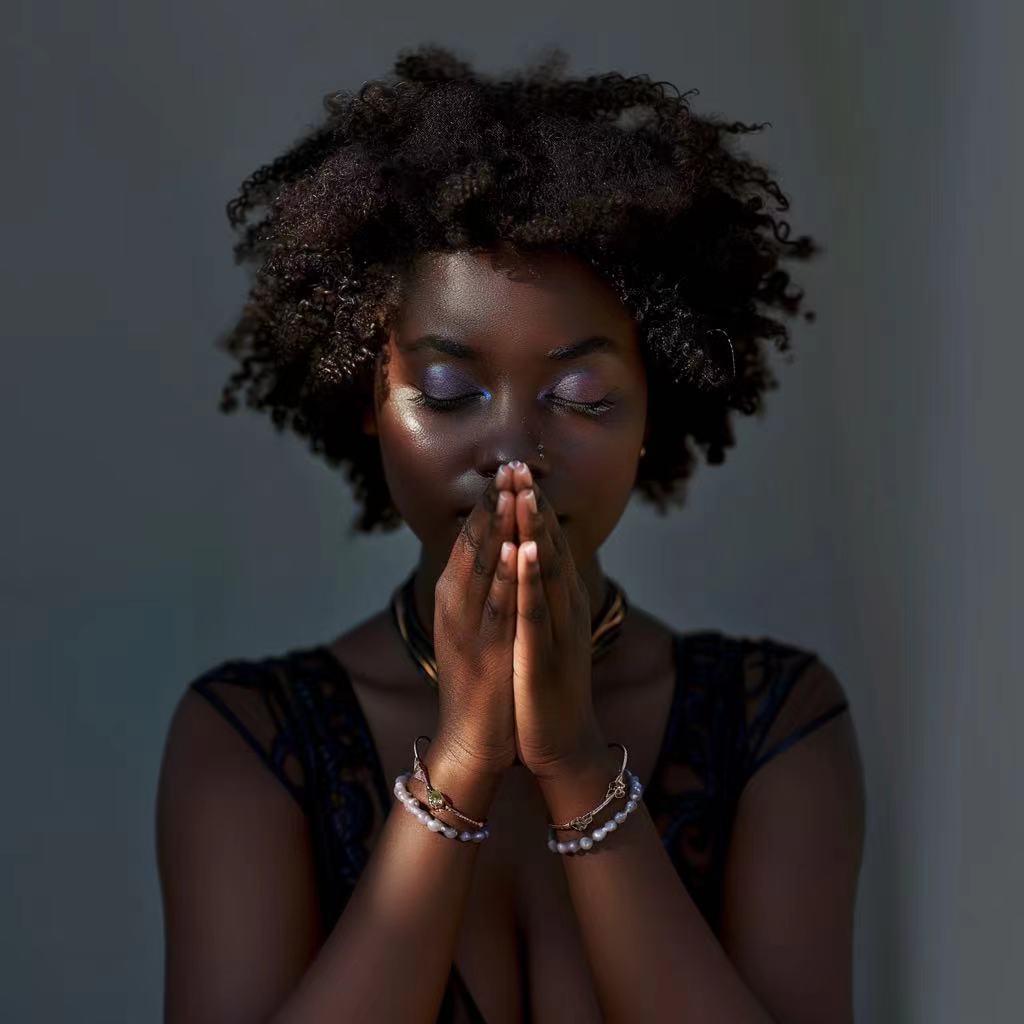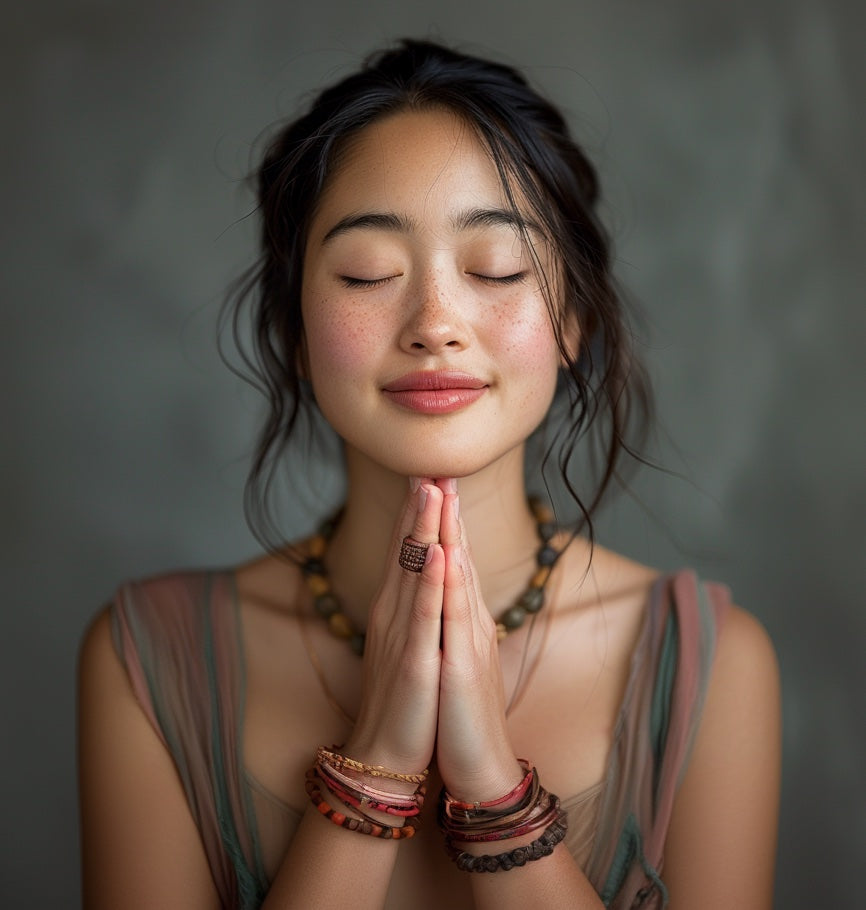
What Feng Shui Cats Really Mean for Your Home
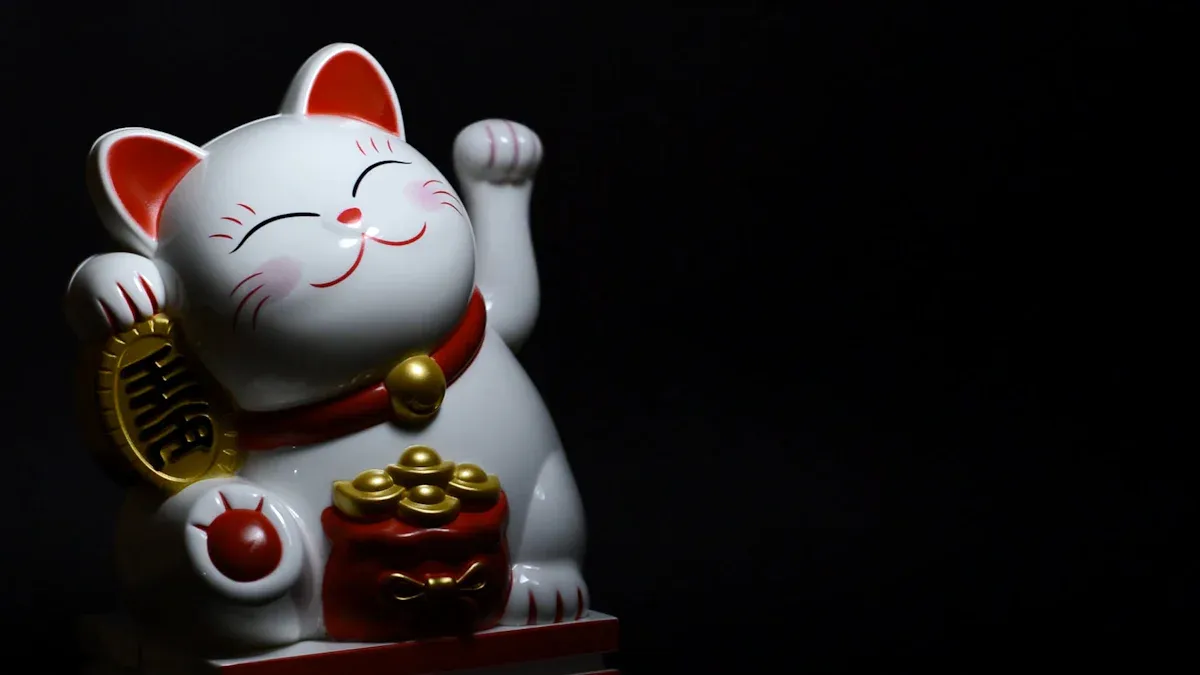
You might have seen a little cat statue waving at you from a shop or a friend’s shelf. That’s a feng shui cat. People call it a lucky cat because it stands for wealth, charm, and good vibes. If you place one in your home, you invite positive energy and new opportunities. Want to boost luck or attract happiness? Try adding a lucky cat to your favorite spot.
Key Takeaways
Feng shui cats, called maneki neko, stand for good luck and happy energy. Put one in your house to bring luck and new chances.
Pick the right paw for your lucky cat. If the left paw is up, it brings people. If the right paw is up, it brings money.
Pick a color that fits your wishes. Gold means money luck. Pink means love luck. Black means safety luck. Every color gives a different kind of luck.
Where you put your lucky cat matters a lot! Put it near the door or in busy spots. This helps it bring more good luck.
Keep your feng shui cat clean and easy to see. A neat room lets good energy move and makes the cat work better.
Feng Shui Cat Symbolism
Lucky Cat and Good Fortune
When you see a feng shui cat, you’re looking at more than just a cute decoration. The maneki neko, also called the beckoning cat, stands as a symbol of good fortune. People believe it attracts good fortune and brings positive energy into your home. The story of the lucky cat goes back to Japan’s Edo era. Shop owners placed the beckoning cat near their entrances, hoping it would bring customers and wealth. Over time, the maneki neko became popular in homes and businesses all over the world.
Did you know? A famous legend tells of a traveler who saw a beckoning cat at a temple. The cat’s gesture saved him from lightning, so he donated money to the temple. This story helped make the beckoning cat a symbol of good fortune and protection. (For more fascinating stories and the historical impact of symbols in feng shui, check out Understanding the Meaning of House Numbers in Feng Shui.)
The maneki neko comes in many colors, each with its own meaning. White stands for purity, gold means wealth, and black helps ward off evil. You’ll find lucky cats in shops, restaurants, and homes, all hoping to attract good fortune. The original maneki neko was white, but now you can choose a color that fits your needs.
Here’s a quick look at how the maneki neko became famous:
Year |
Event Description |
|---|---|
1852 |
The earliest records of maneki neko appear in the Bukō nenpyō, and Utagawa Hiroshige's ukiyo-e shows a beckoning cat at Sensō-ji Temple in Tokyo. |
1876 |
A newspaper article during the Meiji era mentions the maneki neko, showing its growing popularity. |
1902 |
An advertisement proves the maneki neko was well-known by the turn of the century. |
N/A |
Buddhist temples and Shinto shrines, like Gōtoku-ji, claim to be the birthplace of the maneki neko. |
N/A |
A folktale tells of a starving cat that brought prosperity to a shop owner, making the cat a symbol of good luck. |
N/A |
The original color was white, but now black means protection and gold means wealth in feng shui cat symbolism. |
If you want to use a feng shui cat to boost your luck, try these tips:
Place a maneki neko near your entrance to invite wealth and prosperity.
Face the beckoning cat outward to welcome good luck and protection.
Put a maneki neko on your desk to attract success.
Face the beckoning cat southwest if you want to attract love.
Right Paw vs. Left Paw Meaning
You might notice that some beckoning cats raise their right paw, while others lift the left. This isn’t random. The meaning of maneki neko paw positions matters in feng shui cat symbolism.
Raised Paw |
Meaning |
|---|---|
Left |
Invites customers or people |
Right |
Invites money and good fortune |
If you want more customers or friends, choose a beckoning cat with its left paw raised. If you hope for more money and good fortune, pick one with its right paw up. Some lucky cats even have both paws raised, doubling the effect.
In Japanese and Chinese traditions, the left paw beckons people, while the right paw brings wealth. The beckoning cat’s gesture looks like it’s waving, but in Asia, this motion means “come here.” That’s why the maneki neko attracts good fortune and opportunity.
Lucky cats have become a global symbol of good fortune. You’ll see them in homes, shops, and restaurants, all hoping to bring in luck, wealth, and happiness. The maneki neko legends show how a simple cat statue can change your space and your life.
Maneki Neko and Lucky Cat Types
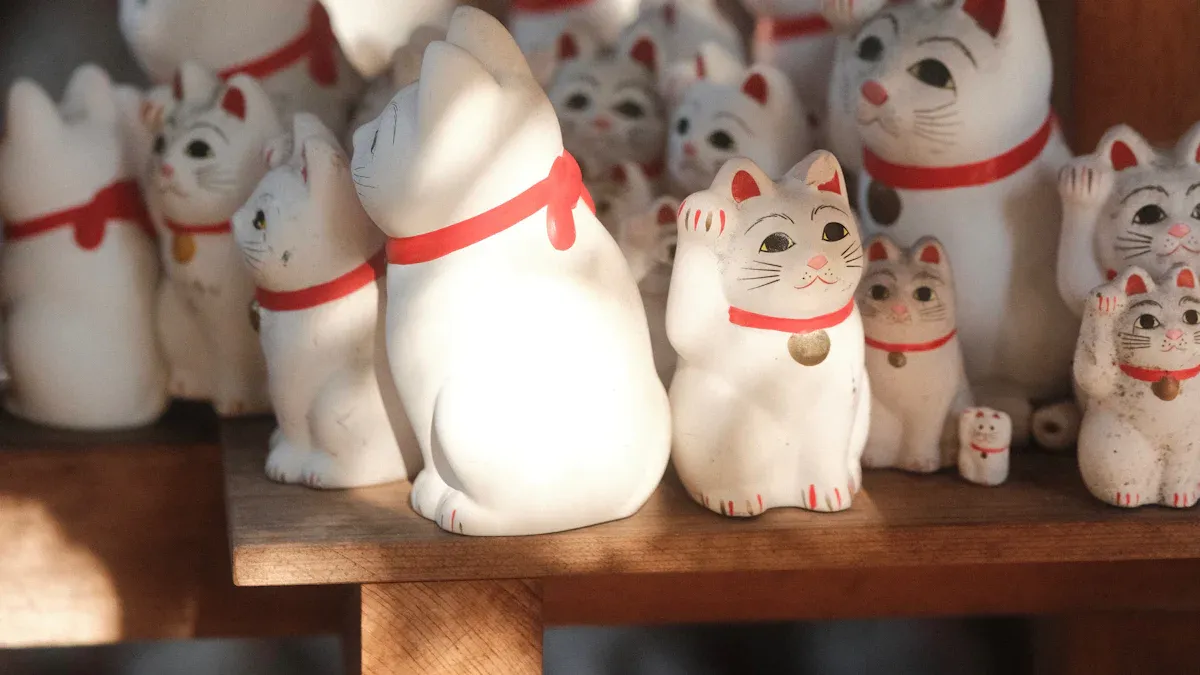
Popular Feng Shui Cat Types
You see maneki neko everywhere, but did you know there are different types? The most recognized lucky cat is the maneki neko with its right paw raised. This version invites fortune and is popular in restaurants and shops. If you want more customers, look for a maneki neko with its left paw raised. That one calls people in, so it’s great for business settings. Sometimes you spot lucky cats with both paws raised. People say this doubles your good fortune or gives extra protection. The height of the raised paw also matters. A higher paw means more luck comes your way. These beliefs come from Japanese culture and change a bit depending on the region.
Tip: Place a maneki neko with a high raised paw near your entrance to attract strong luck and positive energy to your home.
Lucky cats have become symbols of prosperity and good fortune in many cultures. You find them in homes, stores, and even schools. Some people believe maneki neko superstitions, like thinking both paws up might bring bad luck, but most see these cats as cheerful and optimistic. (Learn how different symbols can enhance your living space in How Feng Shui Colors Can Enhance Your Living Space)
Color Meanings and Symbolism
Choosing the right color for your maneki neko can help you focus on what you want most. Each color brings a different kind of luck. Here’s a quick guide:
Color |
Meaning |
|---|---|
White |
Purity and happiness. Perfect for new beginnings or fresh starts. |
Black |
Protection from evil spirits. Good for families and women. |
Gold |
Financial success and prosperity. The gold maneki neko is best for wealth. |
Red |
Health and safety. Helps keep illness away. |
Pink |
Love and romance. Great for relationships. |
Green |
Academic success and personal growth. Ideal for students. |
Blue |
Wisdom and career growth. Supports learning and creativity. |
Yellow |
Family stability and peace. Builds strong friendships. |
Calico |
All-around good fortune. The luckiest and most traditional type. |
If you want more money, pick a gold maneki neko. For happiness, try white. Looking for love? Pink is your best bet. Lucky cats come in many colors, so you can choose one that fits your needs and style. (For deeper insights into how colors influence energy flow, see How to Use Feng Shui Crystals in Every Room of Your Home)
Feng Shui Cat Placement
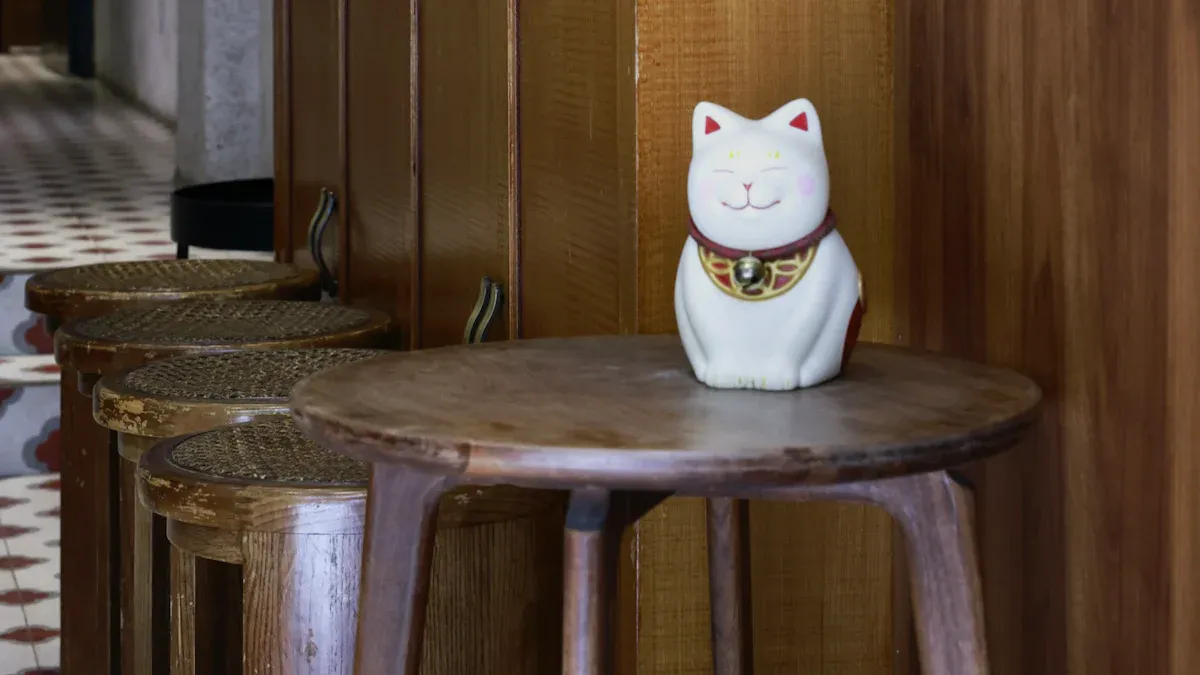
Best Locations for Good Fortune
You want your feng shui cat to work its magic, right? The spot you choose makes a big difference. If you run a business, place your lucky cat near the cash register. This spot helps attract money and keeps the flow of customers steady. In your home, the foyer or entry table is a top choice. When you put your lucky cat here, you welcome good fortune every time someone walks in.
If you have an online business, set your feng shui cat near your computer. Place it on the right side, facing you. This setup helps bring in financial luck and new opportunities. For family happiness, try the living room. Put your lucky cat close to the front door or on a TV cabinet. You want it in a spot where everyone can see it. Some feng shui masters suggest facing your cat south for extra financial energy.
Here’s a quick table to help you pick the best spot:
Location |
Purpose |
Extra Tip |
|---|---|---|
Cash Register |
Attract money |
Use a cat with a raised paw |
Entry Table |
Welcome good fortune |
Face it outward |
Computer (right) |
Online business luck |
Keep it visible |
Living Room |
Family happiness |
Near front door or TV cabinet |
South-facing |
Financial boost |
Use gold or calico lucky cats |
Tip: Always place your feng shui cat in a visible spot. Hidden lucky cats can’t attract the energy you want.
Placement Tips and Common Mistakes
You might wonder if there’s a wrong way to use lucky cats. Placement matters, and a few simple tips can help you avoid common mistakes. First, keep your space tidy. Clutter blocks Qi and stops new energy from coming in. Remove unnecessary items around your feng shui cat. This step makes room for good fortune and keeps your home feeling fresh.
Balance is key. Try to mix the five elements in your space. You can use wood, metal, water, fire, and earth in your decor. This balance helps your feng shui cat work better and brings harmony to your home. If you want to boost financial luck, use gold or yellow colors nearby.
Busy areas are great for lucky cats. Place them where people walk by often, like hallways or living rooms. Avoid putting your lucky cat in dark corners or behind objects. You want it to stand out and catch attention. If you have more than one lucky cat, spread them out. Don’t crowd them together. Each cat needs its own space to attract positive energy.
Here are some quick do’s and don’ts:
Do keep your feng shui cat clean and dust-free.
Do place it in areas with good light and lots of movement.
Do face it toward the main entrance or a busy spot.
Don’t hide it behind plants or furniture.
Don’t put it in the bathroom or laundry room.
Don’t crowd it with too many decorations.
Note: Lucky cats with a raised paw work best when they’re easy to see. If you want more customers or friends, use a left raised paw. For money and good fortune, pick a right raised paw.
You can use lucky cats in both homes and businesses. In stores and restaurants, they help draw in customers and wealth. At home, they bring happiness and prosperity. Many people believe that the right placement of a feng shui cat can change the energy in a room and even improve your financial situation.
If you want your space to feel peaceful, create quiet zones for your lucky cats. Avoid loud noises and high traffic right next to them. This setup lets positive Qi flow and helps your home feel calm. Arrange your furniture so there’s an open path to your lucky cat. This way, energy moves freely and brings good fortune to everyone who enters. (Discover more about optimal placements in Bagua Feng Shui Map Explained for Easy Home Energy)
Myths and Modern Beliefs
Common Superstitions
You might hear all kinds of stories about feng shui cats. Some people say these cats can change your luck overnight. Others believe the waving paw keeps away bad spirits. Folklore has many legends about the Maneki-Neko. Each one highlights its power to bring luck, wealth, or protection.
Here are some of the most common superstitions you might come across:
The waving paw welcomes good fortune and invites positive energy into your space.
Many shop owners place a lucky cat near the entrance, hoping it will attract more customers and boost business.
Some people think the Maneki-Neko has deep feng shui roots, but it started as a decorative item for shops.
You may notice that superstitions often shape how people use and display these cats. In some cultures, the color or the paw position can even affect your choice. People sometimes believe that a cat with both paws raised brings double luck, while others think it might be too greedy.
Fun fact: In many Eastern markets, you’ll see lucky cats sold at prices ending in lucky numbers. This practice makes the cat feel even more special and can make you feel like you’re buying extra luck!
Feng Shui Cats in Today’s Homes
Today, you see feng shui cats everywhere—from cozy homes to busy offices. Modern beliefs have changed how people use these cats. Now, you might pick a cat based on its color or pattern. Each color stands for something different, like love, health, or happiness. You can choose a pink cat for romance or a gold one for financial luck.
Placement matters more than ever. People often put their lucky cat in a spot where it can “see” the door. This way, the cat welcomes new opportunities and good fortune. Some families place their cat in the living room, while business owners keep one near the cash register.
Modern shoppers also let superstitions guide their choices. You might notice that stores use lucky number pricing to make the cat seem even luckier. This trick can make you feel good about your purchase and boost the cat’s charm.
Tip: If you want your lucky cat to work its magic, keep it clean and give it a spot where everyone can see it. A happy cat brings happy energy!
Feng shui cats are more than just cute. They help you feel better and make your home happier. If you put a maneki neko in the right place, it brings good energy. It can help you find love and keep away bad things. Picking the right color can make a marriage happier or keep women safe. The lucky cat helps your home feel safe and full of good things. You can do a few things to help. Clean up your space, make quiet cozy spots, and use wood, fire, earth, metal, and water near your cat. Every house is different, so watch your cat and see what works best.
FAQ
What does a feng shui cat do in your home?
A feng shui cat brings good luck, wealth, and happy energy. You place it where you want more fortune or protection. Many people use it to welcome new opportunities.
Where should you put your lucky cat for best results?
You get the best results when you place your lucky cat near your front door, cash register, or in a busy room. Make sure everyone can see it. Avoid hiding it in dark corners.
Which color feng shui cat should you choose?
Pick gold for money, white for happiness, black for protection, and pink for love. Calico cats bring all-around luck. Choose the color that matches what you want most.
Can you use more than one lucky cat?
Yes, you can use more than one. Spread them out in different rooms. Each cat works best when it has its own space and stands out.
Do feng shui cats have any connection to Taoism or Qi?
Feng shui cats do not come from Taoism, but they help balance Qi in your home. You use them to attract positive energy and create harmony in your space.
See Also
Understanding the Meaning of House Numbers in Feng Shui.




